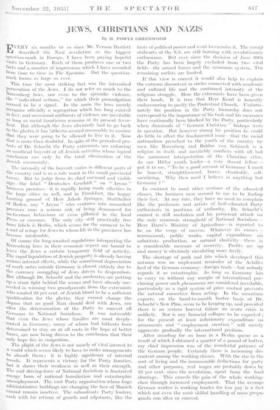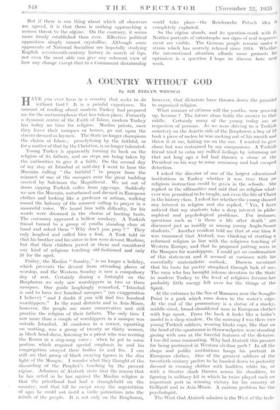JEWS, CHRISTIANS AND NAZIS
13y H. POWYS GREENWOOD
EVERY six months or so since Mr. Vernon Bartlett described the Nazi revolution as the biggeSt question-mark in Europe, I have been paying hopeful 't'isits to Germany. Each of them produces one or two faets and a number of impressions which I have recorded from time to time in The Spectator. But the question- mark looms as large as ever.
This time the most striking fact was the intensified Persecution of the .Jews. I do not refer so much to the Nuremberg laws, nor even to the sporadic violence, the " individual actions," for which their promulgation 8eenied to be a signal. In the main the laws merely l'ceognise officially a segregation which has long existed in fact, and occasional outbursts of violence are inevitable air long as racial fanaticism remains at its present fever- heat. But although the Jews obviously had to go back to the ghetto, it has hitherto seemed reasonable to assume that they were going to be allowed to live in it. Now that is more than doubtful. In spite of the periodical pro- tests of Dr. Schacht the Party extremists are enforcing an unofficial boycott of all Jewish activities whose logical conclusion can only be the total elimination of the Jewish community.
The intensity of the boycott varies in different parts of thc, country and is as a rule worst in the small provincial towns. But to judge from its chief outward and visible sign--the label " I)eutsches Geschaft " on " Aryan " business premises—it. is rapidly being made effective in w the large cities as ell, and in Frankfurt, the happy hunting ground of Herr Jakob Springer, Statthalter of Baden, any " Aryan " who ventures into unmarked premises runs a serious risk of being denounced for un-German behaviour.. oreven .pilloried in the local Press or cinemas. The only city still practically free from labels is Berlin, which seems for the moment to be a sort of refuge for Jews to whom life in the provinces has become intolerable.
9f. course the long-awaited regulations interpreting the Nuremberg` Laws in their economic aspect are bound to leave the Jews a certain temporary field of activity. The rapid liquidation of Jewish property is already having serious internal effects, while the sensational depreciation of mark notes outside Germany is almost entirely due to the currency smuggling of Jews driven to desperation. But although Dr. Schacht and the moderates are putting lip a stout fight behind the scenes and have already suc- ceeded in winning two grandparents from the extremist's who wanted 25 per cent. of JewiSh blood to be a sufficient qualification for the ghetto, they cannot change the dogma that no good Nazi should deal with Jews, nor alter the determination of the Party to convert all Germans to National Socialism.. It . was noticeable that even the Jews whose families are most deeply- rooted in Germany, many of whom had hitherto been determined to stay on at all costs in the hope of better times., are now being driven to the conclusion that their only hope lies in emigration..
The plight of the Jews is not merely of vital interest to a world which seems likely to have to make arrangements to ' absorb them ; it is highly significant of internal trendS. It 'represents a Victory. for the Party fanatics, but it' shoWa their weakness • as well as their strength. The real driving-force of National Socialism is frustrated energy born of national humiliation and catastrophic llUemPloyment The vast Party organisation whose huge fdriiiniStratiVe buildings are changing the face of Munich cannot remain inactive. The subordinate Party leaders, each with his retinue of guards and adjutants, like the taste of political power and want to exercise if. The young stalwarts of the S.S. are still burning with revolutionary enthusiasm. But ever since the decision of June 30.tk the Party has been largely excluded from two vital fields—the armed forces and the economic system. The remaining outlets are limited.
If this view is correct it would also help to explain the extreme discontent in circles connected with academic and cultural life and the continued intensity of the religious struggle. Here the extremists have been given their heads. It is true that Herr Kerrl is honestly endeavouring to pacify the Protestant Church. Unfortu- nately his position in the Party hierarchy does not correspond to the importance of his task and his measures have continually been blocked by the Party, particularly when dismissals of " German Christian " bishops were in question. But however strong his position he could do little to affect the fundamental issue--that the racial nationalism preached to the youth of the country by men like Rosenberg and Baldur von Schirach is a religion in itself, and inevitably conflicts with all but the narrowest interpretation of the Christian ethic.
As one Hitler youth leader—a very decent fellow— put it to me, " To be a good servant of Germany I must be honest, straightforward, brave, charitable, self, sacrificing. Why then need I believe in anything but Germany ? "
In contrast to most other sections of the educated classes, the business men seemed to me to be finding their feet. At any rate, they have no need to complain like the professors and artists of hall-educated Party enthusiasts in positions of authority. Dr. Schacht's control is still unshaken and his persistent attack on the only economic stronghold of National Socialism— Herr Darres Ministry of Agriculture—is reported to be on the verge of success. , Whatever its causes rearmament, public works, capital expenditure on substitute production, or natural elasticity—there is a considerable measure of recovery. Profits are up and money is obviously circulating more freely.
The shortage of pork and fats which developed this autumn was an unpleasant reminder of the Achilles heel of the German economy—foreign trade—but nobody regards it as catastrophic. As long as Germany has to carry on without any margin of international pur- chasing power such phenomena are considered inevitable, particularly as a rigid system of price control prevents the natural corrective from acting. In the meantime exports, on the hand-to-mouth barter basis of Schacht's New Plan, seem to be keeping up, and provided there is no serious harvest failure an acute crisis is unlikely. Nor is any financial collapse to be expected ; for the present at least inflationary expenditure on armaments and " employment creation " will merely aggravate gradually the international position.
After standing for an hour in a Berlin queue as a result of which I obtained a qUarter of a pound of butter, my chief impression was of the wonderful patience of the German people. Certainly there is increasing diS- content among the working classes. With the rise in the cost of living -and the innumerable deductions for party and other purposes, real wages are probably down by 25 per cent. since the revolution, apart from the food Shortage. This cancels the. gain of the whole working- class through increased employment. That the average German worker is working harder for less pay is a fact which not even the most skilful handling of mass propa- ganda can alter or conceal. But if there is one thing about which all observers are agreed, it is that there is nothing approaching a serious threat to the regime. On the contrary, it seems more firmly established than ever. Effective political opposition simply cannot crystallise. Although some opponents of National Socialism are hopefully studying English seventeenth-century history in search of tips, not even the most able can give any coherent view of how any change except that to a Communist dictatorship could take place—the Reichswehr Putsch idea 0 completely exploded. So the regime stands, and its question-mark with its Neither portents of catastrophe nor signs of real improve- ment are visible. The German people remain under a strain which has scarcely ,relaxed since 1914. Whethei the international situation affords more grounds for optimism is a question I hope to discuss here ne,4 week.































































































 Previous page
Previous page